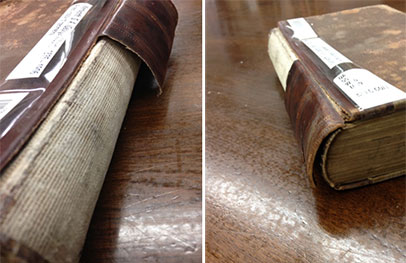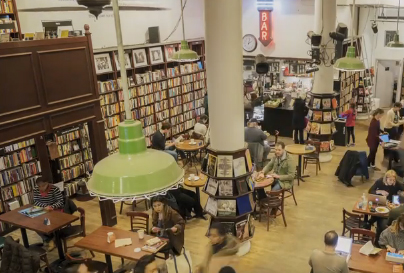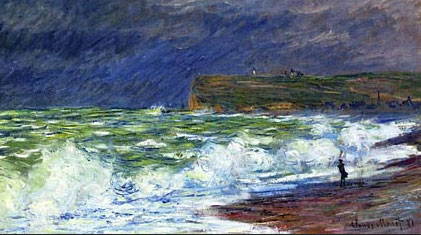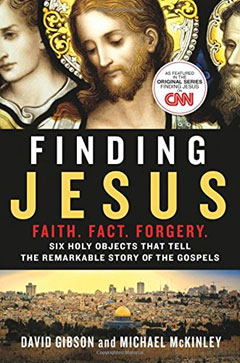 Flute Ensemble: Chamber Music from London & Vienna
Flute Ensemble: Chamber Music from London & Vienna
Friday, May 1, 2015
3:15 p.m. – 3:45 p.m.
Collins Memorial Library, Reading Room
Performance by:
Whitney Reveyrand, Megan Reich, Bianca Lim, Colin Babcock Flutes,
Nic Bailon, Cello
 Flute Ensemble: Chamber Music from London & Vienna
Flute Ensemble: Chamber Music from London & Vienna
Friday, May 1, 2015
3:15 p.m. – 3:45 p.m.
Collins Memorial Library, Reading Room
Performance by:
Whitney Reveyrand, Megan Reich, Bianca Lim, Colin Babcock Flutes,
Nic Bailon, Cello
 Tuesday, May 5th, 4:00 p.m.
Tuesday, May 5th, 4:00 p.m.
Archives & Special Collections,
2nd Floor, Collins Library
Documenting the Slide from Hope to Chaos: The Road to Tian’anmen Square, Professor David Hull, Asian Studies
The Egge Collection is a vast trove of media sources tracking the lead-up to the chaos of Tian’anmen Square in June of 1989. Aside from a couple of very interesting unique artifacts of the movements, the collection’s real value lies in the Chinese print media collected in the weeks leading up to the violent clearing of the square.
Please join us for tea, cookies, and conversation. All are welcome!
Part of the Behind the Archives Door series!
Jessalyn Kreutzer, Best Essay Award
Krista Silva, Single Collector Award
Alicia Matz, Collins Choice Award
The winners of the 2015 Book Collecting Contest, sponsored by the Collins Library and the Book Club of Washington were announced April 23, 2015. The aim of the contest is to encourage full-time students at Puget Sound to read for enjoyment and to develop personal libraries throughout their lives, to appreciate the special qualities of printed or illustrated works, and to read, research and preserve the collected works for pleasure and scholarship. Collections can be on any subject and this contest is open to all full time students. The Book Club of Washington generously funds two cash awards for student winners – $750 to a single collector and $500 for best essay. A third award of $250, the Collins Choice Award, is sponsored by the Collins Library.
The winners are:
Congratulations to all the students who participated in the contest:
Cassandra Childs
Imagining New Worlds: A Fantasy Collection
Zeb Howell
Far Far Away and Further: The Star Wars Expanded Universe
Jessalyn Kreutzer
Liberation in Literature: Lesbian Ecofeminism
Alicia Matz
Epics, Myth and Modern Magic: Where Classics and Fantasy Collide
Louisa Raitt
Tacoma, Havana, Iberia, and Beyond: A Personal Art [History & Critique] Collection
Krista Silva
The Wonderful World of Whedon: A Collection of Texts Celebrating Joss Whedon and His Works
 It’s preservation week! An entire week dedicated to discussing the concerns and solutions regarding preservation of rare books and unique collections. Here in the Archives & Special Collections at the University of Puget Sound, we’ll be showing you some common preservation concerns, highlighting our own collections.
It’s preservation week! An entire week dedicated to discussing the concerns and solutions regarding preservation of rare books and unique collections. Here in the Archives & Special Collections at the University of Puget Sound, we’ll be showing you some common preservation concerns, highlighting our own collections.
Detached Book Boards:
The term book “board” originated from the time when book covers were made of wood in the fifth century and onwards. In the modern day, these boards are typically made of stiff cardboard or paperboard. However, due to environmental factors and mishandling, these boards can become misshapen and even detach, such as in the example below. Tips to prevent this from happening include proper shelving, never pulling a book off a shelf by its spine, and proper storage conditions. In the case of misshapen boards, books can be placed under a moderate weight for several days. Detached boards and torn spines are, however, more difficult to treat. In specific cases, a small amount of paste, PVA, or Japanese tissue with wheat starch paste can repair or reinforce these mishaps, but you want to talk to a professional conservator for that. The joints of books and their boards are the areas that take on the most stress, making them even more susceptible to weakness, so be careful!
Sources:
https://www.library.cornell.edu/preservation/publications/PreservingBooks.pdf
http://www.alibris.com/glossary/glossary-books#c
http://en.wikipedia.org/wiki/Bookbinding
By Monica Patterson
 Remember The Shop Around the Corner? The charming children’s bookstore tragically had to close its doors in 1998 after Fox Books — a big box store with lattés, low prices and unbeatable selection — ran it out of business.
Remember The Shop Around the Corner? The charming children’s bookstore tragically had to close its doors in 1998 after Fox Books — a big box store with lattés, low prices and unbeatable selection — ran it out of business.
Sure, that’s just the plot of the classic Meg Ryan-Tom Hanks vehicle “You’ve Got Mail,” but it was never purely fiction. The battle between Ryan’s tiny independent bookstore and Hanks’ behemoth was being played out, with admittedly less romance, all over the country. Read more of the Huffingtonpost online article about Housing Works Bookstore Cafe and see the video too!
 In honor of Anthony Trollope’s 200th birthday this Friday, April 24th, I am writing today about a little known work of his, a play entitled, The Noble Jilt, a first edition copy of which can be found in the Archives & Special Collections.
In honor of Anthony Trollope’s 200th birthday this Friday, April 24th, I am writing today about a little known work of his, a play entitled, The Noble Jilt, a first edition copy of which can be found in the Archives & Special Collections.
Born in London in 1815, Trollope’s family experienced a rather drastic downfall over the course of his lifetime. His father, originally a barrister, lost his practice, as well as an expected inheritance. As a result of the family’s declining circumstances, Trollope changed schools frequently, and though he tried to attain University scholarships, he was unable to get one. While Trollope’s father was never very successful, his mother actually had a moderately successful writing career, and is most famous for her first book, Domestic Manners of the Americans. For a number of years, the family was largely supported by Frances Trollope’s career.
As an adult, Trollope wound up working as a clerk in a post office and was eventually transferred to Banagher, Ireland as a deputy postal surveyor in 1841. It was here in Ireland where Trollope first began writing. Introduced to the political discontent of the Irish, Trollope hoped to explore this through his novels. He began his first novel, The Macdermots of Ballycloran in 1843, and it was first published in 1847.
In the early years of his writing career, in 1850, Trollope wrote one of only two plays, The Noble Jilt. Plays were not Trollope’s strong suit- The Noble Jilt would not be published until 1923, when Michael Sadleir, a British novelist and book collector, edited and published the first edition of the play based on Trollope’s original manuscript. The first edition of the play was limited to only 500 copies, one of which now resides in Special Collections here at UPS.
In his preface of the first published edition, Sadleir defends Trollope’s failed play, writing that:
So far as is known, Trollope wrote only two plays during the prolific five and thirty years of his life of authorship. The genre was uncomfortable to him. It limited his elbow room and forbade him the accumulation of detail that was his genius. He liked a large canvas and a crowded one. . . The limitations of dramatic form cramped him intolerably
Despite the failure of his attempts at writing plays, Trollope adapted The Noble Jilt as a novel entitled, Can You Forgive Her? which explored the success of traditional Victorian marriages, and questioned the importance of the sexual aspect of marriage, something which would have been a relatively dangerous thing to do with his Victorian audience. So, I suppose you could say that out of the ashes of The Noble Jilt, the phoenix of Can You Forgive Her arose 🙂 Happy 200th to Mr. Trollope!
By Kara E. Flynn
 I Am Malala is the remarkable tale of a family uprooted by global terrorism, of the fight for girls’ education, of a father who, himself a school owner, championed and encouraged his daughter to write and attend school, and of brave parents who have a fierce love for their daughter in a society that prizes sons.
I Am Malala is the remarkable tale of a family uprooted by global terrorism, of the fight for girls’ education, of a father who, himself a school owner, championed and encouraged his daughter to write and attend school, and of brave parents who have a fierce love for their daughter in a society that prizes sons.
I am Malala will make you believe in the power of one person’s voice to inspire change in the world. Check it out in the Popular Collection!
 For April Poetry Month, we feature “Beautiful” poems. Here is one favorite called Dover Beach:
For April Poetry Month, we feature “Beautiful” poems. Here is one favorite called Dover Beach:
The sea is calm to-night.
The tide is full, the moon lies fair
Upon the straits; – on the French coast the light
Gleams and is gone; the cliffs of England stand,
Glimmering and vast, out in the tranquil bay.
Come to the window, sweet is the night-air!
Only, from the long line of spray
Where the sea meets the moon-blanch’d land,
Listen! you hear the grating roar
Of pebbles which the waves draw back, and fling,
At their return, up the high strand,
Begin, and cease, and then again begin,
With tremulous cadence slow, and bring
The eternal note of sadness in.
Sophocles long ago
Heard it on the {AE}gean, and it brought
Into his mind the turbid ebb and flow
Of human misery; we
Find also in the sound a thought,
Hearing it by this distant northern sea.
The Sea of Faith
Was once, too, at the full, and round earth’s shore
Lay like the folds of a bright girdle furl’d.
But now I only hear
Its melancholy, long, withdrawing roar,
Retreating, to the breath
Of the night-wind, down the vast edges drear
And naked shingles of the world.
Ah, love, let us be true
To one another! for the world, which seems
To lie before us like a land of dreams,
So various, so beautiful, so new,
Hath really neither joy, nor love, nor light,
Nor certitude, nor peace, nor help for pain;
And we are here as on a darkling plain
Swept with confused alarms of struggle and flight,
Where ignorant armies clash by night.
-Dover Beach
Matthew Arnold
Looking for some Japanese artwork for that ARTH 368 class project? Need some inspiration for your own art piece? Intrigued by Asian art in general? Then come and check out Hiraki korekushon ukiyoe in the Archives & Special Collections! These oversized volumes (20!) feature a multitude of pieces ranging from snowscapes to seascapes, and everything in between. With 20 volumes full of countless pieces by a wide selection of Japanese artists, you’ll be sure to find exactly what you’re looking for! Perfect for art history majors and art connoisseurs alike! So come and check it out Tuesdays, Wednesdays, Thursdays 1:00-3:00pm in the Archives & Special Collections, room 211!
By Monica Patterson
 Finding Jesus provides a fresh look at the life of Jesus through six blockbuster artifacts — including the Shroud of Turin, pieces of the True Cross, and the bones of John the Baptist. Telling the story behind each artifact, Finding Jesus investigates whether the relics are authentic or fraudulent, in the company of sleuths and scholars who use modern-day tools to solve ancient riddles.
Finding Jesus provides a fresh look at the life of Jesus through six blockbuster artifacts — including the Shroud of Turin, pieces of the True Cross, and the bones of John the Baptist. Telling the story behind each artifact, Finding Jesus investigates whether the relics are authentic or fraudulent, in the company of sleuths and scholars who use modern-day tools to solve ancient riddles.
This is one of the newest books in our constantly changing Popular Reading Collection! Visit the collection to see over 180 titles of current interest!